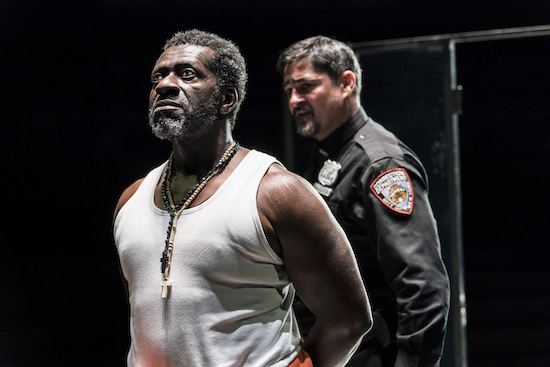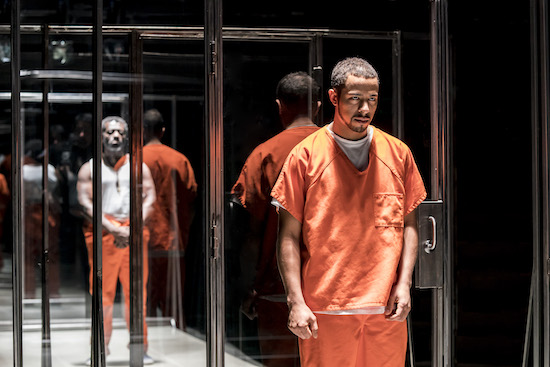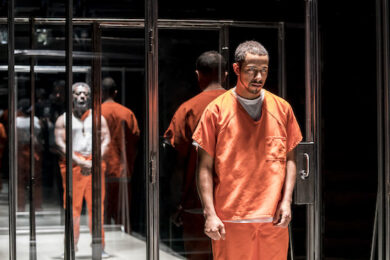Oberon K. A. Adjepong and Ukweli Roach in Jesus Hopped the ‘A’ Train at the Young Vic. Photo by Johan Persson
The hexagonal Young Vic auditorium has been split down the middle, and the stage resembles a cat walk, long and narrow, with the audience on either side. The actors are trapped in the middle, exits blocked by glass security doors that slide up and down on rollers, controlled by unseen hands. Magda Willi’s sparse set leaves no hope of escape, and no hope of avoiding judgement.
Stephen Adly Guirgis’ play, Jesus Hopped the ‘A’ Train is a prison drama set (although we discover this only at the very end) in New York’s Riker’s Island Prison. It revolves around two central characters incarcerated in the jail: Lucius, a serial killer awaiting extradition to Florida for execution; and Angel, who “shot the Reverend Kim in the ass” but did not expect him to die. A third character, a conflicted, morally opaque lawyer (Dervla Kirwan) represents Angel and pivots through his parts of the story.
Guirgis’ play was a hit when first performed in the USA in the early 2000s, and Philip Seymour Hoffman’s production came to London in 2003. Kate Hewitt’s revival for the Young Vic is a chance to see how well its stark, demonstrative look into the darkness of guilt and redemption has lasted, and whether it is the modern classic some suggested at the time.
Unfortunately, the new production reveals a conceptually disjointed piece of writing, big on effects and lacking in coherence. Its most obvious drawback is a lack of dramatic drive which – in a play that covers child murder, prison rape, cults, God, guilt, lies and the American justice system – is a strange failing. All the main characters have set piece speeches in which they confront their demons, and the play revolves around these, but they are all soliloquies. It soon becomes apparent that the play fits onto such an unusually shaped stage because there is almost no need for scenes involving more than two characters, and much of the time only one actor is performing. The play is essentially a set of monologues stitched together at the edges, and showing signs of fraying.
This structural failing reflects the lack of a coherent relationship between the three stories that form the play. Lucius has done terrible things but now he has found God. He shares an isolation wing with Angel, placed there for protection after he was attacked and raped while on remand. A sadistic guard runs the wing, making life unpleasant for both of them. Angel debates guilt and faith with Lucius, but his concerns are entirely different. He shot the Reverend Kim character who ‘stole’ his friend by persuading him to join a ‘son of God’ cult, and is now in way over his head. His lawyer, who talks mostly to the audience, presents herself as reasonable, measured and in charge, but her ego will evidently lead to her client going to jail. She teaches him to lie to protect himself, but it is not apparent whether this is a good thing or not, and it does not work. These characters seem to belong to different plays, and Kirwan’s character has no contact at all with Lucius. Guirgis skips around topics while we wait to find out where he plans to focus.

Oberon K. A. Adjepong and Joplin Sibtain in Jesus Hopped the ‘A’ Train at the Young Vic. Photo by Johan Persson
It seems Jesus Hopped the ‘A’ Train is a play about perceptions of guilt. Can someone, such as Lucius, who has done the worst things imaginable, be condemned as a murderer in the same way as accidental killer Angel? Is the refusal to consider Lucius’ brutal upbringing based on race? And can religious faith change someone, even someone with a past like Lucius? An examination of the psyche of the most depraved serial killer could be fascinating, but we never get this. Instead, the Lucius presented on stage spends his time arguing about religion, which turns him into just another born again Christian with little new to offer. US actor Oberon KA Adjepong, as Lucius, has the star part and plays it to the hilt, but Guirgis offers him set pieces rather than character development.
Guirgis’ writing has a curious tone, often more black comedy than realism. This is perhaps not surprising from the man behind Synecdoche New York, but it sows confusion over how seriously we are meant to take the play’s themes. The slapstick-with-guns story shooting of the Rev. Kim could be plucked straight from Chester Himes’ brutally funny Harlem crime novels. It sits oddly alongside the straight confessional story of a lawyer’s struggles, delivered by Kirwan. The latter works hard, but finds little coherence in a part that fails to integrate with the main thrust of the play. Meanwhile, Ukweli Roach as Angel convincingly communicates the character’s emotional desolation, hidden behind a truculent exterior. However, Angel’s journey from new inmate to desperate lifer is occurs largely through off-stage events rather than through action and dialogue.
There is a powerful play about the US justice system hidden in here, waiting to get out. Angel’s fate is not related to what he has done, or to justice at all, but depends on plea bargaining, competing egos and placating the DA. There are moments when the play discusses the racial prejudice underlying supposed justice, and comes to life. These modern scandals are even more relevant fifteen years on, and have been recently been documented much better by the ‘This American Life’ podcast. There are glimpses of energy in these aspects of the play, but they are thrown away. Instead, Guirgis provides a disconnected roam across semi-connected individuals, book-ended with the underdeveloped warden characters, that leaves us none the wiser about the big issues he appears to tackle. There is plenty of noise and fury on offer, but a real lack of clarity over what Jesus Hopped the ‘A’ Train is really about.
Jesus Hopped the ‘A’ Train is at the Young Vic until 6 April



